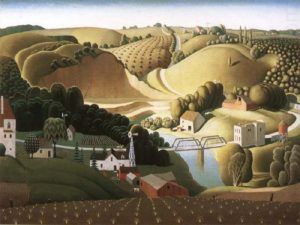Iowa

Regionalism Redux
It might be a good time to revisit Grant Wood's “Revolt Against the City" (PDF can be found here). The American Gothic artist wrote the essay in 1935, in the throes of the Great Depression. The gist of the essay: The Great Depression has been good for the United States. It has helped free its arts from European influence and, in particular, compelled the eastern coastal cities to appreciate regional, rural art more.
If you substitute “COVID crisis” for “Great Depression,” “China” for “Europe,” and “commercial interests” for “art,” parts of the essay become contemporary:
Economic and political causes have contributed in these days to turn us away from Europe [CHINA] . . . The Great Depression [COVID] has taught us many things, and not the least of them is self-reliance. It has thrown down the Tower of Babel erected in the years of false prosperity; it has sent men and women back to the land; it has caused us to rediscover some of the old frontier virtues.
The essay focuses on the arts, so it doesn't work, grammatically, to substitute “commercial interests” for “art” throughout the entire essay, but the theme of the essay applies.
Every region of our country is different, Wood says, so each region gives rise to different art. In the “Middle West,” where Wood lived, the art doesn't jump out at you, like it does in the perfect scenes of New Mexico, California, or parts of New England, but rather must be “hunted for.” It requires more analysis and reflection, plus an intimate acquaintance with the region, which gives such art more depth.
I think Wood was saying, “Any slob can paint the beautiful cliffs of Highway One in California. It takes a philosopher-artist to paint the rolling fields of rural farms in Iowa.”
Shift to commercial interests. A parallel truth is at work: “Any slob can make money from a New York Stock Exchange index fund in a bull stock market that is reaping rewards from the huge market that is China. It takes a philosopher-investor to make money in Iowa.”
Just as art can be created anywhere, money can be made anywhere.
But you need to produce something. You need to provide a service or product people want.
You don't do that when you're merely plopping your money in a mutual fund. If everyone merely plopped their money into a mutual fund that invests in big corporations with ties to China and then waited for the money to roll in, we'd have a barren economy, much like Grant Wood said of the art scene prior to the Great Depression: All they did was adopt art from France, which dominated Boston and New York galleries, resulting in a vapid art scene.
In the regions like the Middle West, though, art continued to flourish, albeit without a national interest . . . until the Great Depression.
Likewise, business opportunities have continued to flourish in the “Middle West,” albeit without national interest due to everyone's infatuation with China. Anyone, anywhere can make a dollar, if he has muscle, brains, or energy. And if he has all three, he can make a lot of money. The man who makes money in the Middle West doesn't need China. Yes, it's not as easy as merely plopping money into a mutual fund.
But neither does the man who merely plops money in a mutual fund create anything or provide anything of value, like the entrepreneur in the Middle West does.
If COVID turns our attention from China to start appreciating what we can produce on our own, like Grant Wood said the Great Depression turned our attention from Europe to start appreciating what our artists produce on their own, this whole thing will have been worth it.
